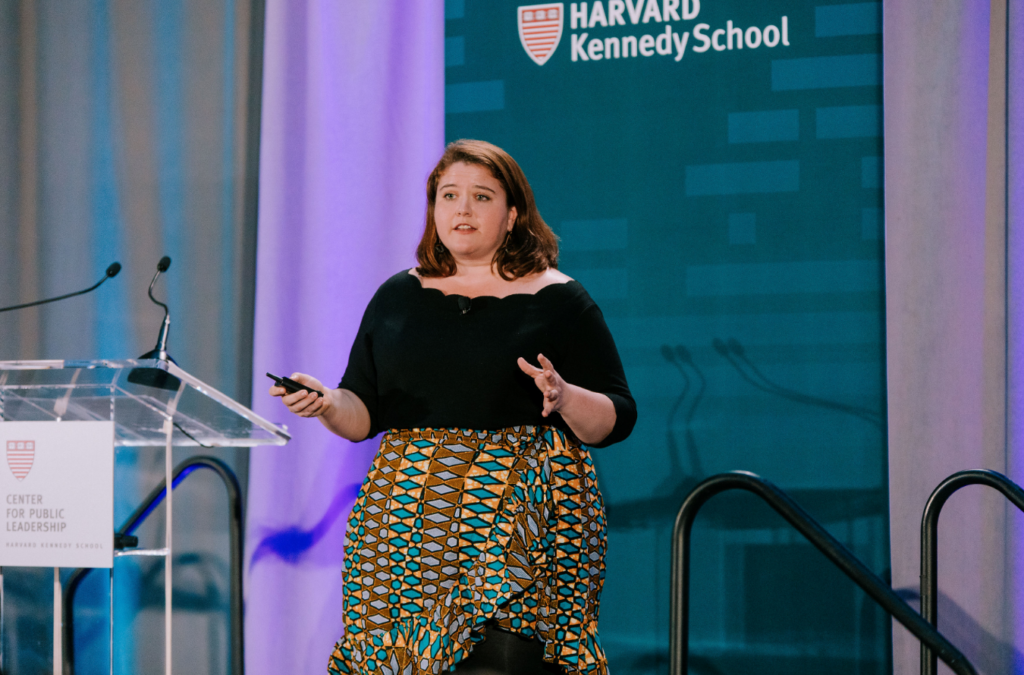Meghan McCormick, a 2018 Cheng Fellow, is the Founder of OZÉ, a platform that empowers small-business owners to make data-driven decisions. Meghan and the OZE team is passionate about enabling small businesses and local ownership to grow with technology, particularly in emerging markets. In April, OZÉ won the $75,000 Grand Prize in the Social Impact & Cultural Enterprise Track at the 2018 Harvard President’s Innovation Challenge. Read more about Meghan below in a piece originally published by the Harvard innovation labs.
Correctly identifying the problem you want to solve is a huge part of building a startup. But sometimes when you’re problem-focused, the problems are all you can see.
In West Africa, plenty of well-intentioned people and organizations before Meghan McCormick have tried to tackle the region’s worrisome youth unemployment problem. In Ghana, for example, more than half of the population is below the age of 25 (about 15 million people). The World Bank, meanwhile estimates that nearly half of people between the ages of 15 and 25 are jobless. That’s raised big concerns about poverty, crime, and recruitment for terrorism.
Turning to the economic sector, there are hundreds of thousands of small business owners in Ghana, but McCormick says most of them don’t know how to do the basic financial analysis required to understand how to grow their operations. Record-keeping also is rudimentary at best. The end result: Most businesses never scale beyond a sole owner-operator to the point where they can hire even one employee.
That’s discouraging, she says, but only if you take “a problem-driven” mindset, instead of an “asset-driven” one.
“They may not be using digital tools, but they’re keeping paper records,” McCormick says of African small business owners. “And they know their customers better than a Western business would.” An asset-driven mindset, she says, asks how to create a solution “that optimizes what they have … rather than going in and saying ‘Oh, there’s all these problems that we need to fix.’”
McCormick, is the founder of OZÉ, which bills itself as “The business insights engine built for the African business owner.” Just a few months after launching in Accra, Ghana’s capital and largest city, OZÉ has already surpassed the Uber driver app to become the country’s No. 1 business app on the Google Play store.
A dual-degree candidate at the Harvard Kennedy School and MIT’s Sloan School of Management, McCormick has been focusing on Africa since 2011, when she worked for the Peace Corps in Guinea. She credits the agency with helping her develop her approach to solving business problems.
“I like to say that the Peace Corps is the most underrated social business accelerator out there,” she says. “Your mandate is to find and solve problems in a way that respects local culture and builds on capacity. It forces you to think about everything in new ways.”
McCormick spent a few years as a consultant back in the US, but soon Africa beckoned again. Her first venture was a nonprofit organization called Dare to Innovate, which she started in Guinea in 2014 to help young African entrepreneurs build socially-conscious businesses. Things were going well (they had funded seven businesses and were preparing to launch a second cohort) until the Ebola virus hit.
Forced to cancel the program and leave Guinea, McCormick and her team retrenched and started rethinking. A venture that could operate remotely and utilize assets already on the ground, they figured, would be less prone to disruption. And by incorporating “this massive installed base of small businesses who aren’t employing anybody” into a solution, she says, that solution would scale much faster.
So rather than trying to turn African soda pop distributors into MBAs or building 50-employee businesses from scratch, OZÉ is working to solve a big problem in small increments. They’re doing it by giving African entrepreneurs enough business insight to grow just a little — the OZÉ app collects transaction and other data from small business owners in real time and pushes back insight and advice on topics like pricing, customer behavior, and controlling transportation costs.
“We’re not going to plop a textbook in front of anybody, but we’re going to give bite-sized learning, just in time,” McCormick says. The app is also gamified, encouraging entrepreneurs to earn badges for gaining insights. Once they collect enough badges, they earn the right to be connected with potential lenders and investors. As the app goes further into development, McCormick says, business owners will eventually be able to send and receive payments, to attract capital and equity, and to communicate with investors.
The approach helped OZÉ win the $75,000 Grand Prize in the Social Impact or Cultural Enterprise Track at the 2018 Harvard President’s Innovation Challenge this spring. To some, creating one job at a time may seem like thinking small, but McCormick says she hopes OZÉ will someday have a major, even generational, impact.
Youth unemployment, she says, is classified by the World Bank as a form of social exclusion that hurts not only young people in developing nations, but their future children as well. Studies show that people who were jobless while they were young are much more likely than people who were unemployed later in life to have children who struggle with joblessness.
“If we can just get 10 to 15 percent of businesses grow to the point where they can add one job a year, that solves the problem of youth unemployment,” she says. “That’s the ultimate social outcome that we hope to have.”

